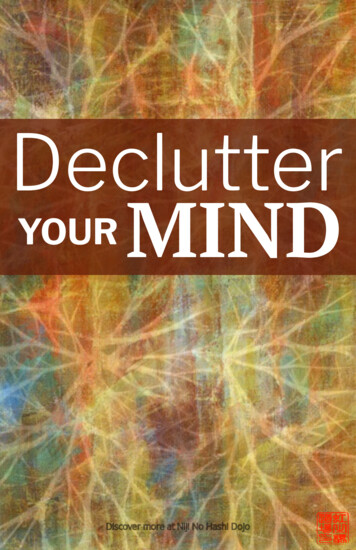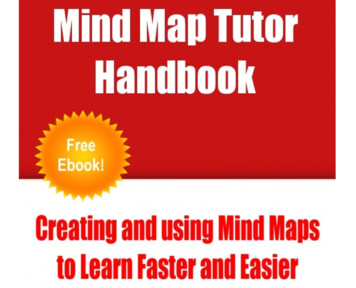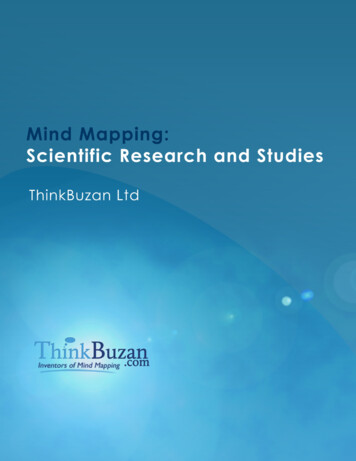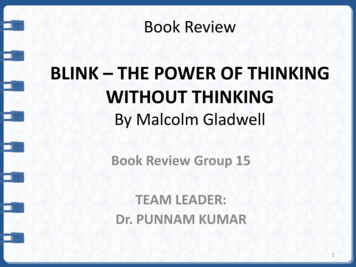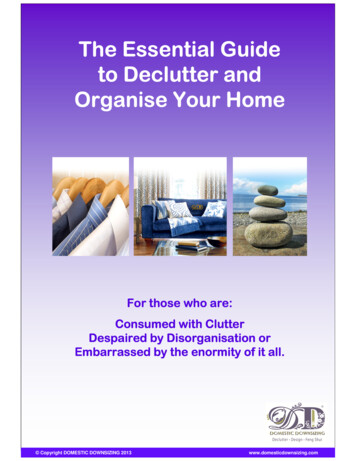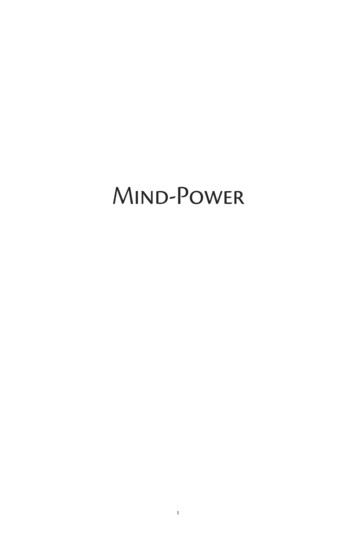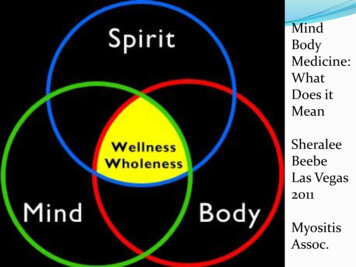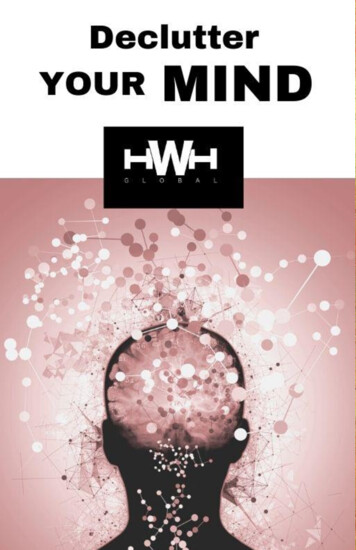
Transcription
DeclutterYour Mind
ALL RIGHTS RESERVED. No part of this report may be modified oraltered in any form whatsoever, electronic, or mechanical, includingphotocopying, recording, or by any informational storage or retrievalsystem without express written, dated and signed permission from theauthor.AFFILIATE DISCLAIMER. The short, direct, non-legal version is this:Some of the links in this report may be affiliate links which means that Iearn money if you choose to buy from that vendor at some point in thenear future. I do not choose which products and services to promotebased upon which pay me the most, I choose based upon my decision ofwhich I would recommend to a dear friend. You will never pay more foran item by clicking through my affiliate link, and, in fact, may pay lesssince I negotiate special offers for my readers that are not availableelsewhere.1DISCLAIMER AND/OR LEGAL NOTICES: The informationpresented herein represents the view of the author as of the date ofpublication. Because of the rate with which conditions change, the authorreserves the right to alter and update his opinion based on the newconditions. The report is for informational purposes only. While everyattempt has been made to verify the information provided in this report,neither the author nor his affiliates/partners assume any responsibility forerrors, inaccuracies or omissions. Any slights of people or organizationsare unintentional. If advice concerning legal or related matters is needed,the services of a fully qualified professional should be sought. This reportis not intended for use as a source of legal or accounting advice. Youshould be aware of any laws which govern business transactions or otherbusiness practices in your country and state. Any reference to any personor business whether living or dead is purely coincidental.Copyright
Table of ContentsIntroduction.3The Primary Causes of Mental Clutter .4Environment .4People . 10Distractions . 14Thoughts . 18Mental Habits . 18Everyday Stress . 20Decisions . 21Unfinished Business . 22Dealing withThought-Based Clutter . 23The Breath is the Key. 23
DECLUTTER YOUR MINDOvercome Negative Thoughts. 33Clarify Your Purpose . 35Conclusion . 392
DECLUTTER YOUR MINDIntroductionThe word decluttering doesn’t just apply tohousekeeping. In a household setting,decluttering refers to cleaning, general tidying,and eliminating things from the home that havebecome useless or obsolete.The same concept can be applied to your mind. It’sthe process of lowering the burden on your mind byeliminating unnecessary worry and thoughts.This can be accomplished by making changes toyour life and your thought processes. Although clutteris always caused by your mental processes, externalevents can serve as triggers.Eliminating the triggers is a powerful way todeclutter your mind.But you can also have ineffective habits for dealingwith stress, boredom, and uncertainty. Excessivethinking can be another form of mental clutter. It usesvaluable resources and drains your ability to focus.3
DECLUTTER YOUR MINDYour environment is another possible source ofmental clutter. A cluttered environment isn’tconducive to a calm and relaxed attitude. The peoplein your life can also clutter your mind.It’s important to address every possible cause.“When we clear the physical clutter from our lives,we literally make way for inspiration and good,orderly direction to enter.”- Julia CameronThe Primary Causes ofMental ClutterEnvironmentYour environment includes your home and workenvironments. You spend most of your time in one of4
DECLUTTER YOUR MINDthese two places. Avoid underestimating the impactyour environment can have on your mental clutter.Removing environmental clutter can have a positiveeffect on the clutter between your ears.Cleaning your office won’t trigger feelings ofsentimentality, but decluttering your home will. Themost important criteria when deciding whether or notto keep an item are: Do I love it? Do I need it?If the answer is “no” to both questions, get rid of it.Sentimentality is a trap. There’s no reason to keepyour plastic prom corsage from 1986 if it spends itsentire life in a box in the garage.However, there are worse offenses in the universe.Just be aware of the tendency of sentimentality tocontribute to your environmental and mental clutter.Declutter your home and work environments first:1. Tackle one room at a time. Attempting to take ontoo much at once will not only lead to failure, butyou’ll also increase your level of mental clutter. Let’snot lose ground before we even get started!5
DECLUTTER YOUR MIND A quick declutter is enough. Assuming you’renot a hoarder, each room shouldn’t take morethan 30 minutes to clear away the visual clutter.2. Start at the top and work your way down. Look atanything hanging on the walls. Do you love it? Doyou need it? If the answer to both questions is “no”,sell it, throw it away, or give it away. Regardless ofwhich option you choose, do it quickly.3. Go through any closets, drawers, and shelves.Repeat the same process. If you don’t need it orlove it, get rid of it.4. Finish the room. Consider the furniture, books,items under the bed, your clothes, and so on. Everysingle item should be considered for elimination. Beruthless. You don’t use 90% of your possessions. Youwon’t miss them.5. Complete the rest of the house. Include the garage,refrigerator, under the sinks, and every otherlocation. Do you have more towels than you need?Do you have towels that are so threadbare that youavoid using them? Shoes that hurt your feet? Getrid of it all. Anything that stays in the house shouldbe important to you or your life.6
DECLUTTER YOUR MIND Focus on one room per day. It’s not necessary tospend a lot of time on each room if you movequickly and don’t spend 10 minutes on eachitem. If you’re not positive about keeping it, letit go. Remember your car. In fact, you can declutteryour car every time you fill your gas tank. Don’tjust stand there watching the numbers increaseon the gas pump! Declutter your car while youwait.6. Address your work environment. Your workenvironment might consist of a desk and cubicle oran office. Or you might be responsible for an entirefacility. Declutter whatever falls under yourresponsibility. Pay special attention to your deskand old files. Take the appropriate actions.7. Remember your digital environment. This can bethe most tedious part of your decluttering efforts. Itmight take the better part of a Saturday tocomplete. Computer. This includes your computer desktopand all your files. Eliminate everything you don’tneed. Organize files and icons as necessary.7
DECLUTTER YOUR MINDConsider defragmenting your hard drive afteryou’re done. Declutter your work computer, too. Email. How many emails do you have that youdon’t need? Remember to spend time on allyour email accounts. Phone. Delete old text messages. Delete appsyou no longer use. Update your apps asnecessary.8. Evaluate how you feel. After all of these unnecessaryitems are out of your house and workspace, noticehow you feel. You likely feel happier, lighter, and lessburdened. It’s a good feeling. Remember it. Andremember what caused it – less things in your life,not more.It might seem counterintuitive to address yourenvironment when your challenge is morepsychological in nature.However, your environment can influence theamount of stress and anxiety you experience. This cantrigger mental habits that create the mental clutteryou’re trying to relieve.8
DECLUTTER YOUR MIND“I'm quite an untidy person in a lot of ways.But order makes me happy. I have to have aclear desk and a tidy desktop, with as fewvisual distractions as possible. I don't mind sounddistractions, but visual ones freak me out.”- Joanne Harris9
DECLUTTER YOUR MINDPeopleThere are certain people that are hard to eliminatefrom your life. Your children are one example. Nomatter how old your children may be, the bondbetween parent and child is strong. However, thereare situations that can justify eliminating adultchildren or your parents from your life. Not everyonehas a place in your life.Your life is sacred. Be careful whom you choose toinclude.Consider how much the people in your life addand detract from it:1. Which people are a source of negativity? Thesepeople aren’t negative about your life. They’renegative about life in general. These are the peoplethat are pessimistic, complain about everything, andsuck the life out of you every time you see them.Ask yourself why you keep them around.2. Consider the toxic people in your life. Toxic peopleget in your way. They’re the people that get in theway of you reaching your goals. They’re10
DECLUTTER YOUR MINDdiscouraging and sabotaging. For some reason,they feel better if you don’t better yourself. It’s rare to have people that truly want to seeyou excel. However, that’s no reason to toleratethose who intentionally become obstacles inyour life. If it’s a close friend or family member, first have afrank discussion. If that fails to have an effect,then show them the door.3. Friends from another time. It might be an oldcollege friend or a co-worker from 20 years ago. Doyou have anything in common besides a past? Howmuch enjoyment do you receive from them? Thinkabout it and make the necessary adjustments.4. Unfamiliar social media pals. You know thesepeople. They’re Facebook “friends” that are actuallyfriends of friends of friends. Do you need to see thebirthday pictures of their grandchildren? If you’re using social media to promote yourbusiness, the more the merrier. Otherwise, makethe necessary cuts.5. Think about the people at work. You have feweroptions here. You might be able to eliminate thosetroubling people that work for you, but even that’s11
DECLUTTER YOUR MINDnot easy in today’s day and age. You can findanother position within the same company or atanother company. You might have to fire your bossand find another opportunity.Not everyone deserves to be part of your life. Asfar as anyone knows for certain, you only get onechance. Ensure you’re not allowing the people aroundyou to lower the quality of your experience. Eliminatethose people that are unnecessary or that you don’tlove.Make room for people that will contribute to yourlife and happiness.“As important as it is to learn how to deal withdifferent kinds of people, truly toxic people will never beworth your time and energy - and they take a lot ofeach. Toxic people create unnecessary complexity,strife,and, worst of all, stress.”12
DECLUTTER YOUR MIND- Travis Bradberry13
DECLUTTER YOUR MINDDistractionsDistractions can be clutter in themselves.Distractions can also be contributors to clutter bydiverting your attention from what’s important andallowing clutter to grow. Procrastination is a selfcreated phenomenon that everyone faces.You never feel good while procrastinating. Thework that you’re avoiding is still hanging over yourhead. No distraction is enough to completely eliminatethat nagging feeling. You continue to check the timeand shift your attention back and forth between thedistraction and the work you should be doing. Theresult is mental clutter.Some distractions aren’t all that distracting. Theyjust happen to be a more enjoyable option than thework you should be doing. However, somedistractions are highly distracting in their own right.Evaluate the distractions you face in your life eachday:1. How do you waste time? Forget aboutprocrastinating. If you have nothing pressing on14
DECLUTTER YOUR MINDyour schedule, how do you waste time? Make a list.A few popular culprits include: Internet TV Cell phone-related activities Video games Shopping Mindless chatting with friends These are likely the same ways you spend yourtime while procrastinating.2. Consider the cost of losing that time. Even if youonly waste one hour per day, and it’s likely muchmore than that, that’s 365 hours per year. That’sover nine 40-hour work weeks. That’s over twomonths! What else could you do with that hour? Exercise Build a blog Take a college course Make new friends Write a book Learn a language15
DECLUTTER YOUR MIND Learn an instrument Remember that you likely waste a lot more than60 minutes each day!3. Make a list before bed. Prepare a list of the mostimportant 3-5 tasks you have to do the followingday. Ensure that at least half of your list are itemsthat will move your life forward in some way.4. Understand why those items are important.Understand the benefit you’re gaining by takingthese actions.5. Reduce each task to the necessary steps. Tasks thatare too big or too poorly defined encourageprocrastination.6. Reduce your distractions. Remove any distractionsfrom your environment. Turn off your phone. Turnoff the internet. Unplug the television. Shut thedoor to your office. Lock yourself in a bare closet ifyou must.7. Set a timer. Unless you’ve been meditating in a cavefor the last ten years, you can’t expect yourself to beable to concentrate for 8 hours straight. Use a timerto create time boundaries. Most of us canconcentrate for 30-60 minutes at a time. Then take abreak for 5-10 minutes and get back after it.16
DECLUTTER YOUR MINDDistractions are everywhere. Some of us arenaturally better at ignoring distractions than others.Use your time to the best of your ability by reducing thedistractions in your life. You’re then in a strongerposition to avoid procrastination.Consider that the worst procrastinators you knoware struggling the most with life. Procrastination isperhaps the greatest fertilizer for mental clutter.“Elegance is achieved when all that is superfluoushas been discarded and the human being discoverssimplicity and concentration: the simpler andmore sober the posture, the more beautiful it will be.”- Paulo Coelho17
DECLUTTER YOUR MINDThoughtsYour thoughts are the genesis of mental clutter.This is where it all starts. Get control of your thoughts,and your mental clutter will be tamed. This is a majortask, and not for the faint-hearted! It can be done,though.There are several things that affect your thoughts,including: Mental habits Everyday stress Making decisions, especially when there are toomany options Unfinished businessMental HabitsLike your actions, many of your thoughts arehabitual. You think about the same past experiencesover and over. You daydream about the sameimagined future over and over. These thoughts may18
DECLUTTER YOUR MINDbe positive or negative, but they still contribute tomental clutter.There are other mental habits that provide littlebenefit: Guilt Worry Regret Comparing yourself to others Gaining self-esteem by pleasing others Mentally checking out when faced with stressfulsituations Worry what others think of you Expecting the worst Thinking about the past and the futureContemplate whether you struggle with any ofthese negative mental habits.19
DECLUTTER YOUR MINDEveryday StressThis is a big one. Your mind fills with clutter as yourstress level increases. Your thoughts become lesscontrolled and more negative. It’s not surprising thatmany serious mental health issues are oftenprecipitated by stressful events. The level of stress thatyou face each day is relevant to the amount of mentalclutter you have.It’s often the accumulation of little things that havea significant impact. It’s traffic, late bills, a runny nose,an annoyed spouse, and a broken shoelace that cansend your brain into a tailspin. Too many smallerstressors can be just as stressful as large stressors.“The greatest weapon against stress isour ability to choose one thought over another.”- William James20
DECLUTTER YOUR MINDDecisionsMaking a lot of decisions can really wear you outand create mental clutter. There’s a reason why SteveJobs, Barack Obama, and Albert Einstein limited theirdaily wardrobes to just a few items – the eliminationof choice.When you’re faced with too many decisions,mental clutter grows.Studies also show that making decisions decreasesyour ability to make additional decisions. Eliminate asmany possible decisions as you can each day.This is one good thing about habits. Habitseliminate the need to make a choice. Stick with thesame healthy breakfast and take the same route towork each day.Use habits to your advantage and save yourdecision-making muscles for important decisions.21
DECLUTTER YOUR MINDUnfinished BusinessOften the result of procrastination orindecisiveness, unfinished business takes up valuablemental space. It’s the phone call you need to make.It’s cleaning out your storage unit. It’s finishing yourtaxes. It’s getting the oil changed in your car.These things can seem trivial in the short-term, butthere’s a price to be paid each day. Notice how muchbetter you feel when you complete theseresponsibilities.“Being in control of your life and havingrealistic expectations about your day-to-day challengesare the keys to stress management, which is perhapsthe most important ingredient to living a happy,healthy and rewarding life.”- Marilu Henner22
DECLUTTER YOUR MINDDealing withThought-Based ClutterThere’s good news. All of your mental clutter isultimately self-induced. Fortunately, that means thatyour mental clutter is under your control. It alsomeans that you don’t have anyone to blame besidesyourself.The Breath is the KeyThe process of breathing is pretty amazing. It’s theonly bodily function that you can consciously controlor have done for you automatically. You can breathemore deeply or more shallowly on command. Fast orslower isn’t a problem either. On the other hand, youcan forget all about breathing and it still happens.An adult at rest takes roughly 20 breaths perminute. That’s over 28,000 breaths per day. Most ofthose breaths happened without any intention onyour part. You weren’t even aware of at least 99% ofthem.23
DECLUTTER YOUR MINDAmazing.Some might argue this arrangement is necessaryfor speech to occur. Maybe it’s more than that. Maybeit’s the secret to managing your thoughts!There are two ways breathing benefits mentalclutter:1. Changing your breathing can change yourphysiology. Try breathing faster for a minute andnotice how you feel. Now breathe very deeply for aminute and notice the changes. Changes to yourbreathing change your physiology. Changing yourphysiology can change your thoughts and yourfocus.2. Focusing on your breath can keep your mind in thepresent moment. Your breath is your thread to thepresent. No matter how distracted you are by yourthoughts, focusing on your breath can bring youback to reality.Breathing doesn’t seem too exciting, but it’s apowerful tool. What could be more simple? However,there is a skill component to using your breath in yourclutter-reducing efforts. It will take time and patienceto develop fully.24
DECLUTTER YOUR MINDUse your breath to alter your physiology:1. Find a quiet place, if possible. If you’re at work,close your office door or head for the bathroom.The more solitude you can find, the better. However,the technique will work anywhere, especially withpractice.2. Take a comfortable position. Seated is best. Ideally,you can assume a position that you can maintain forat least five minutes without moving.3. Inhale slowly and deeply through your nose. Allowyour stomach to expand. You’re not trying tobreathe so deeply that you feel pain. Just take a fullbreath. Feel the air pass by the tips of your nostrils.Then relax and allow the air to expel naturally. Avoid overcomplicating the technique. Full,slow, and easy breaths are the objective. Payingattention to your breath for just five to 10minutes can be enough to feel a significantreduction in both your stress level and mentalclutter.This simple technique can be used anytime you’refeeling stressed or your mind is cluttered. This fallsshort of true meditation, but you can receive many ofthe same benefits.25
DECLUTTER YOUR MINDThis focused breathing technique can be used in thecar, during a meeting, or any time you need to gainback control of your racing brain.Meditation is the next logical step. Meditation islike focused breathing on steroids. It’s more than justa quick-fix. It can literally transform your life.There are many scientifically-proven benefits tomeditation:1. Meditation decreases depression. Meditation hasbeen shown to reduce obsession on one’sdiscomfort and distress. In other words, you spendless time thinking about your challenges. This leadsto a lower incidence of depression.2. Meditation increases the ability to regulate yourmood. We have some control over our moods, justnot as much as we’d like. You can probably think ofsomeone in your life that regulates their moodsvery poorly. You never know what you’re going toface when you see them. Meditation enhances theability to manage your moods.3. It decreases anxiety. Both emotional and physicalstress markers are reduced in those who meditate.26
DECLUTTER YOUR MIND4. It increases the ability to focus and work understress. This can be one of the biggest benefits tothose who meditate to declutter their mind. It’s not easy to sit still for an extended period oftime and maintain your focus. As that abilitygrows, you can apply it to other areas in yourlife.5. Meditation increases resilience. You’ll beoverwhelmed less frequently and find it easier tocontinue during times of stress.There is a nearly endless list of the benefitsprovided by regular meditation. But it’s obvious thatmeditation is a great tool to declutter your mind.When you’re in a better mood, feel less stress, and areable to focus, your mind is less cluttered!Everyone has at least a vague idea of what isinvolved in meditation, but the details are a little fuzzyfor most. This is understandable, as there are manytypes of meditation.Mindfulness meditation is an excellent choice forthose who want to declutter their thoughts. This typeof meditation is based on observations. You’re not27
DECLUTTER YOUR MINDthinking, evaluating, or interpreting your thoughts.There’s no judging involved.You’re just paying attention in a particular way.Since it’s just a particular way of paying attention,you can do it during a variety of activities. Theseinclude: Driving Eating Cleaning Showering Mowing the lawn Using the phoneWhile some forms of meditation attempt to limitthoughts, mindfulness meditation simply notices thethoughts that appear. This is great for beginners,because limiting your thoughts is very challenging!Mindfulness meditation is a simple, yetchallenging, process:28
DECLUTTER YOUR MIND1. Assume a comfortable seated position. A chair isfine. The floor is also an acceptable option. Comfortand support are key.2. Become aware of your surroundings. Notice thetemperature of the room. Notice the physicalsensations of your feet, hands, back, neck and everyother part of your body. Notice what you can see inthe room. What do you hear? Avoid judging anything. Even labeling isn’tpermitted. For example, you might notice a bluepiece of artwork on the wall. It’s not appropriateto say to yourself, “Wow, that’s kind of ugly.”Saying something positive about the artworkisn’t any better! Avoid even saying to yourself,“Blue artwork”. Keep your thoughts limited to what you can see,hear, and smell. If you hear a dog bark andremind yourself that you don’t like that dog,you’re not being mindful. Just notice the dogbarking. It’s surprising how relaxing this can be. Justnotice and keep your brain’s big mouth shut. Dothis for five minutes.29
DECLUTTER YOUR MIND3. Turn your attention to your breath. Feel the breaththroughout your body. Start at the nostrils andnotice the movement and sensations of your chestand abdomen. Keep your attention on the part ofyour body where the breath is most easily felt. Continue this until the end of the meditation.Strive for a total time of at least 20 minutes.4. Notice your thoughts. Invariably, it won’t take toolong before you realize that you’re thinking aboutyour meeting tomorrow or your best friend fromthird grade. That’s okay. Again, avoid labeling yourthoughts. The following are unacceptable: “That’s a weird thought.” “Why did I think about that?” “What’s wrong with me? “I must be nuts.” As with the sights and sounds in yourenvironment, notice the thought without takingthe next step of judging or labeling.5. Return your awareness to your breath. It’s thatsimple.30
DECLUTTER YOUR MINDOver time, you’ll find that your thoughts,judgments, and tendency to label things will decrease.The result is a decrease in your mental clutter.Consider how much mental noise you generateeach day. Imagine you’re walking from your car intowork. It’s 90 degrees outside. Think about theconversation you might have with yourself. “It sure is hot today.” “I wonder what the news predicted for the hightoday” “It’s okay. We’ll be in the air conditioning soon.” “That’s a nice tree. I wonder how old it is?”Labeling things in your environment is a habit thataccomplishes little. You don’t need to tell yourself it’shot outside. You already know! You don’t need tocomfort yourself by telling yourself that you’ll be inthe cool a/c in just a minute. You already know! Youcan see the tree just fine, too.Meditation helps to quiet this unnecessary mentalnoise. When you stop generating mental chatter, youcan deal with the real clutter in your life much moreeffectively. You’ll be amazed at how capable you really31
DECLUTTER YOUR MINDare.“Meditation is difficult for many people because theirthoughts are always on some distant object or place.”- Wayne Dyer32
DECLUTTER YOUR MINDOvercome Negative ThoughtsAre you plagued by mental negativity? Do you saynegative things to yourself? Do you worry about thefuture? Do you criticize yourself and spend too muchtime focused on what you lack? That’s natural.Scientists have a theory to explain all this negativethinking.It was imperative to human survival. Unfortunately,it’s not helpful anymore.There was a time that food was scarce. A memberof another tribe might beat you to death with a clubjust for looking at his mate. There were dangerousanimals. Those that were overly cautious and worriedsurvived more often than those with a more relaxedattitude.Now we have grocery stores, police, and most ofthe predators aren’t an issue. We have armies to fightour wars.Your negative thinking is something you inherited.However, it no longer serves you.33
DECLUTTER YOUR MINDDeal quickly with your negative thoughts:1. Understand that your negative thoughts are hurtingyou. Ninety-nine percent of your worries andnegative self-talk are harming you. Believe thatsimple fact and you’re halfway to freedom.2. Be observant. Your new meditation skills will behelpful. Notice when you’re having a negativethought.3. Distance yourself from the thought. When you thinkto yourself, “I’m not good enough to do this,”change it to “I’m having a thought that I’m notgood enough to do this.” This simple process puts space between you andthe thought. You realize that it’s somethingseparate from you.4. Replace the thought. Reverse the thought. Tellyourself that you’re good enough. Tell yourself thatthings will be okay. Is it true? Well, it’s no more of alie than telling yourself something negative. At leastyou’ll feel better and be in a better position tothrive. Considering that things usually work out, it’smore accurate than your negative thoughts.34
DECLUTTER YOUR MIND“There is a plan and a purpose, a value to every life,no matter what its location, age, gender or disability.”- Sharron AngleClarify Your PurposeIndecisiveness can be the result of a lack of clarity.If you’re unclear about your values and your goals, youlack purpose. You’ve been developing your valuessince childhood. They undergo modification as youage and develop new perspectives on life.But you’ve probably never really given your valuesmuch thought. Now is the time to take a hard look.Determine your values and make easier, morecongruent decisions:35
DECLUTTER YOUR MIND1. Determine what’s most important to you in life. Askyourself the question and see what pops up. A fewpossibilities include: Beauty Truth Tolerance Success Service Discipline Humility Happiness Family Generosity This is just a small sampling. Make your own list.2. Reduce your list to just 6 values. Which are mostimportant to you? What do those values mean toyou? Take your time.3. Are you living your life according to these values?Consider these parts of your life: Career36
DECLUTTER YOUR MIND Relationships Hobbies Family life GoalsDo these parts of your life reflect your values? Ifnot, why? How would your mental clutter be affectedif you changed your life to reflect your values?By defining your values, it becomes much easier tomake decisions and set appropriate goals. When yourlife is in alignment with your values, your level ofmental clutter will decrease. Adjust your life andactivities to match your va
DECLUTTER YOUR MIND 3 Introduction he word decluttering doesn’t just apply to housekeeping. In a household setting, decluttering refers to cleaning, general tidying, and eliminating things from the home that have become useless or obsolete. The same concept can be applied to your mind. It’s the process of lowering the burden on your mind by
